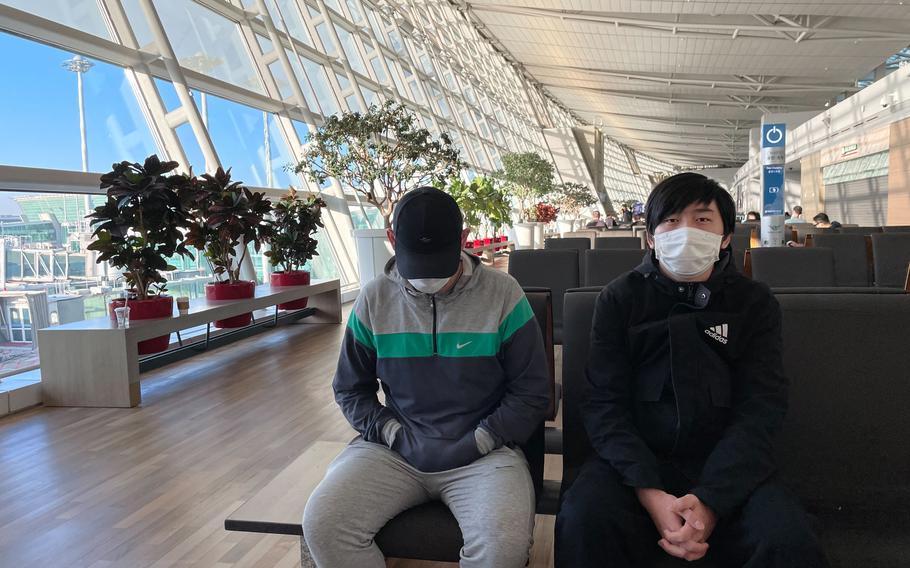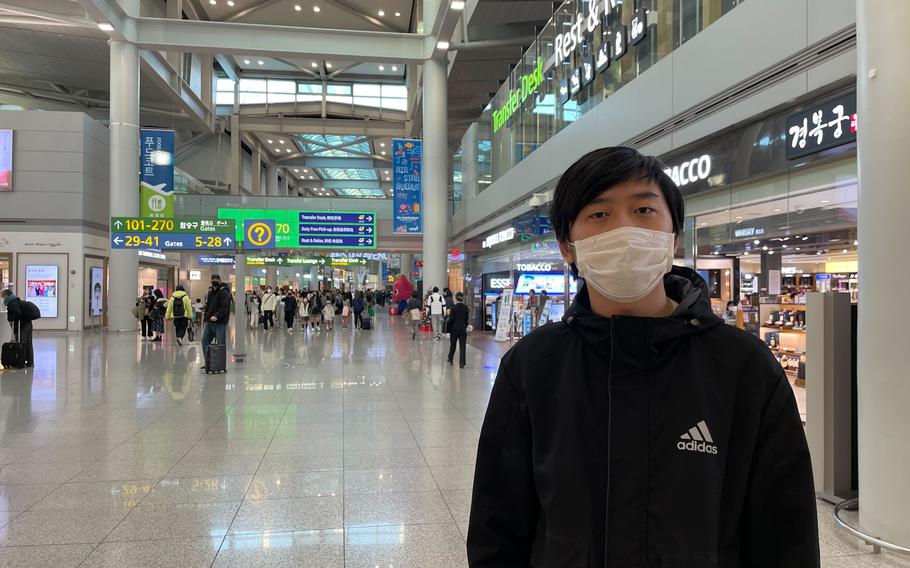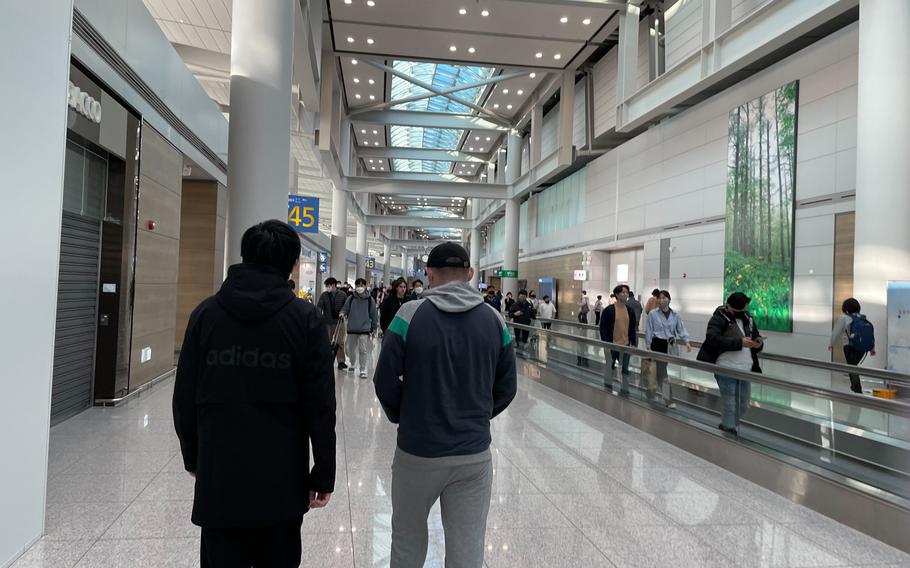
Vladimir Maraktaev, 23, (right) and a 30-year-old man who spoke on the condition of anonymity are among the five Russians who arrived at South Korea’s Incheon Airport seeking refugee status after receiving a draft notice, but remain in limbo. (Michelle Ye Hee Lee/The Washington Post)
INCHEON AIRPORT, South Korea — The Russian men now have inside jokes with the South Korean staff they see at 6 p.m. every day at the Burger King in Terminal 1. They spend their days walking around, smoking cigarettes or learning Korean. They wash their clothes with bathroom soap.
For these five men who fled Russia to avoid conscription in the war against Ukraine, Incheon International Airport has been their temporary home for the past three months.
They arrived at the airport, located about 32 miles west of Seoul, in October and November seeking asylum. But South Korea, which has a low rate of accepting refugees, deemed them unqualified to even apply and rejected their applications. The men appealed the decision, and three of them will find out Jan. 31 whether their appeal will be accepted.
“It’s our last chance here, in Korea,” said one of the men, who is 31 and spoke on the condition of anonymity for fear for his safety upon potential repatriation.
They are among more than 180,000 Russian nationals who escaped their country after President Vladimir Putin on Sept. 21 declared a “partial” military mobilization of reservists for his war in Ukraine, leaving countries across Europe to grapple with whether to open up their countries to the exodus.
Some affected by the order fled, while others left because they feared the government would conscript any able-bodied men out of desperation for fighters.
Vladimir Maraktaev, a 23-year-old university student from the Republic of Buryatia in Siberia, received his draft notice Sept. 24 and left home that day without his fiancee. So many Russians have already died to fight in a war that he opposes, he said.
“I don’t want to hurt people. I don’t want to die myself, as well. But I feel this conflict is extremely political,” he said. “It’s an imperialistic war in my opinion, conquering a neighboring brotherly nation. ... I have all the respect for Ukrainians for defending their home.”
It’s Maraktaev’s first time in South Korea, which he said he chose as his destination after reading about the country’s former presidents who have been convicted and jailed for crimes, including for corruption, which he called “mind-blowing.”
“It’s hard to see, in any world, Russian leaders get accused and actually confirmed of anything — corruption, bribery, et cetera. ... It just felt really refreshing,” he said.
A 30-year-old, who spoke on the condition of anonymity out of fear for his safety, said he left Russia just after receiving his conscription notice on Sept. 28 because he had protested at anti-government rallies and had been investigated for his stance. It was already unsafe for him to be home in Siberia, and even less safe after his order, he said.

Vladimir Maraktaev, a university student from the Republic of Buryatia in Siberia, received his draft notice on Sept. 24 and left home that day. (Michelle Ye Hee Lee/The Washington Post)
Fearing he would be sent to the front lines, he left his wife and child home and escaped. He crossed into Kazakhstan and decided on South Korea because it was a democracy, he said.
He and two others who arrived at Incheon Airport in October will find out Jan. 31 whether they will qualify to apply for refugee status.
If they succeed, they will be able to leave the airport and enter South Korea until they receive a determination on their status, which could take up to a year, said their lawyer Lee Jong-chan, of the Advocates for Public Interest Law. The other two men — Maraktaev and the 31-year-old — will have their first court hearing on Jan. 31.
Under South Korean law, people can apply for refugee status at a port of entry, such as an airport, and are interviewed for a pre-assessment. If they qualify to apply, the immigration office refers them to refugee screening. The Ministry of Justice declined to specify why it rejected their application.
Lee said his clients were rejected because evading the draft is not a qualifying criteria for refugee status.
South Korea, which also requires all able-bodied men to enlist in the military by age 28, takes draft evasion seriously. But Lee is appealing the decision, arguing that Russians fleeing the draft and disagreeing with the war should be considered differently.
“A person who is obligated to serve in Korea who simply leaves the country to avoid military service and applies for refugee status, say in the United States, it would be difficult to get refugee status. That is understandable,” he said. “But if people at risk of forced conscription in a war-torn country like Russia flee because they oppose the war, we generally view as a reason to be considered a refugee.”
South Korea has called Russia’s invasion of Ukraine “unlawful and illegitimate” and joined the West in imposing economic sanctions. But it has also been wary of its bilateral relationship with Moscow and rejected repeated requests from Kyiv for lethal weapons, though it is increasingly providing indirect military support.
Lee said he was optimistic that the men will get a hearing, as their cases are similar to the hundreds of Yemenis and more than 1,200 Syrians who arrived in South Korea to flee the war at home. Most of those applicants were ultimately denied refugee status, but granted one-year humanitarian visas. It is unclear how the government will decide on the Russians’ case.
In 2019, before refugee applications plummeted because of the coronavirus pandemic, South Korea recognized 79 of 15,452 applicants as refugees and granted 230 people humanitarian stay permits that year.
The most urgent issue for now is getting the men out of the airport, Lee said.

If they succeed in applying for refugee status, they will be able to leave the airport and enter South Korea until they receive a determination on their status, which could take up to a year, said their lawyer Lee Jong-chan, of the Advocates for Public Interest Law. (Michelle Ye Hee Lee/The Washington Post)
Until then, the Russians sleep in a small holding room in the departure area that is housing eight other men. There is a shower room with unreliable hot water. They receive three meals per day: pastry and orange juice at 8 a.m., rice and chicken at 12 p.m., then pastry and orange juice again at 5 p.m.
At 6 p.m., they wander to the Burger King to buy something else to eat. The staff recognizes them as the foreigners who live in the airport. They have an irregular sleep schedule because their hours and days blur together, and often end up at the 24-hour Dunkin’ for a bite or a coffee. The duty-free areas don’t like them loitering around since they can’t purchase anything without boarding passes or passports, which were confiscated, they say.
“Not only do we know the airport, the airport knows us,” said the 31-year-old. “I’ve never smoked cigarettes but I started smoking here. I’m living now in the smoking rooms.”
Their Russian credit cards are declined due to financial sanctions on Russian banks. So they hang out around a gate where flights to Kazakhstan typically take off, and chat up Russian-speaking tourists who can give them cash in return for money wired from their Russian bank accounts.
Even a five-star airport like Incheon, which is among the busiest and cleanest airports in the world, can feel dreadful if it’s the only place you can be. They’re bored, anxious, nervous and hopeful, and have been to every part of Terminal 1 that allows them. They miss fresh air and taking a walk outdoors.
The two men said they are bracing for a long slog at the airport.
“We’re pretty stoic, I think,” Maraktaev said. “Well, we have to be, just have to be patient, have to be strong in mental status.”